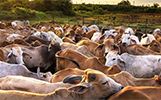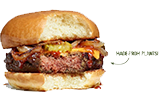| New Research Argues No Need to Double Food Production by 2050 
Food Tank (blog) | August 2017
A team of researchers from major American land–grant universities recently published a study in BioScience challenging the familiar assertion that "to feed the world, we need to double food production by 2050."
The year 2050 is only 33 planting seasons away, as the study's lead author Mitch Hunter stresses. Achieving a 100–percent increase from current production—or doubling it—would mean growing output faster than humans ever have, year over year for those next three decades straight. Reaching that milestone through continued conventional intensification would have dramatically negative environmental and social impacts.
While a body of research from the early 2010s did predict a doubling of demand by 2050, Hunter's study argues that the data now support a more moderate 26 to 68–percent increase. The new research indicates that "roughly historical rates" of production growth should be able to meet this lower demand.
The Grassroots of Sustainability: Beef's Sustainability Advantage
Bryan Weech, Beef Magazine | August 03, 2017
Alan Savory, who developed the concept of Holistic Planned Grazing, said, "Without agriculture it is not possible to have a city, a stock market, bank, university, a church or army. Agriculture is the foundation of civilization, and the basis for any stable economy." Agriculture plays a key role supporting society, but increasing demand will create challenges.
In the face of pressure to feed a growing world population, a need to utilize resources more wisely and rising consumer expectations, several initiatives have been developed. These include the U.S. Roundtable for Sustainable Beef, the Canadian Roundtable for Sustainable Beef, The Global Roundtable for Sustainable Beef, the Roundtable for Sustainable Rangelands, and state and national grazing lands coalitions to name a few.
However, mostly overlooked in the sustainability discussion is beef's sustainability advantage. Beef production relies on grazing to produce a product that is nutrient dense, and therefore can be sustainable in ways other food sources can't.
New Natural Nutritional Supplement Could Be Key to 'Climate–Friendly' Beef 
Sustainable Brands | August 14, 2017
The realities of climate change and shifting consumer preferences for responsible, sustainable products have sparked a paradigm shift in the food industry, one that is leading food companies and farmers alike to rethink the way food is produced and manufactured.
The relationship between global warming and beef production in particular has long been a hot button issue for the industry. According to the UN Food and Agriculture Organization (FAO), the global livestock industry is responsible for 15 percent of all greenhouse gas emissions (GHGs) caused by humans, making it the third–largest contributor of GHGs, after energy and industry
These investors are backing meat that currently costs $18,000 per pound to produce. No doubt that number will come down, and eventually this product will be sold through regular retailers.
Bill Gates, Tyson Foods and Richard Branson Show Interest in Projects that Grow Clean Meat 
Asheley Rice, Health Thoroughfare | August 25, 2017
The population is growing and with it so does the demand in food. Today people in the US are searching for organic products and sustainable food which is also animal–friendly. So how can you get meat without hurting animals but still enjoy the taste and the proteins? Memphis Meats is currently producing meat from animal cells without raising and slaughtering animals. They make beef, chicken and duck. They have raised $17 million from Cargill, Gates and billionaire Richard Branson.
Richard Branson has responded in an e–mail to Bloomberg News that he's thrilled to have invested in the Memphis Meats and that he expects that in 30 years killing animals for meat won't be necessary. He believes that the self–producing meat will be clean or plant–based and taste exactly like the traditional meat, but will be healthier.
As Climate Change Gathers Pace, Is Livestock a Problem Or Solution?Busani Bafana, Reuters | August 23, 2017
Even during droughts like the one that swept across Zimbabwe last year, Isaac Siziba and his wife Khumutso had food. Their annual harvest did not consist of water–dependent crops, but of goats.
"Goats are easy to breed and reproduce fast, even in the worst environment, but with good management perform better and give income quickly," Siziba said as he stroked a prized Boer ram in his goat pen in Bolobelo village in Gwanda district.
To Siziba, debate among experts about the sustainability of livestock farming – which is criticised by some for its huge environmental "hoofprint" – seems detached from the practicalities of life in Gwanda.
Almost 10pc of Farmers Use 'Second Chance' in New Quality Assurance Scheme 
Ciaran Moran, Independent.ie | August 22, 2017
Bord Bia has confirmed that some 7,220 farmers have been audited to date for certification in its new Sustainable Beef and Lamb Assurance Scheme.
The new scheme which replaced the BLQAS on April 24 is a close–out based model, which means that you have up to one month to address non–compliances found (if any) during your inspection.
This change gives farmers time to address minor issues without affecting their ability to claim the QA bonus when selling animals in the month after the audit has taken place. | |
